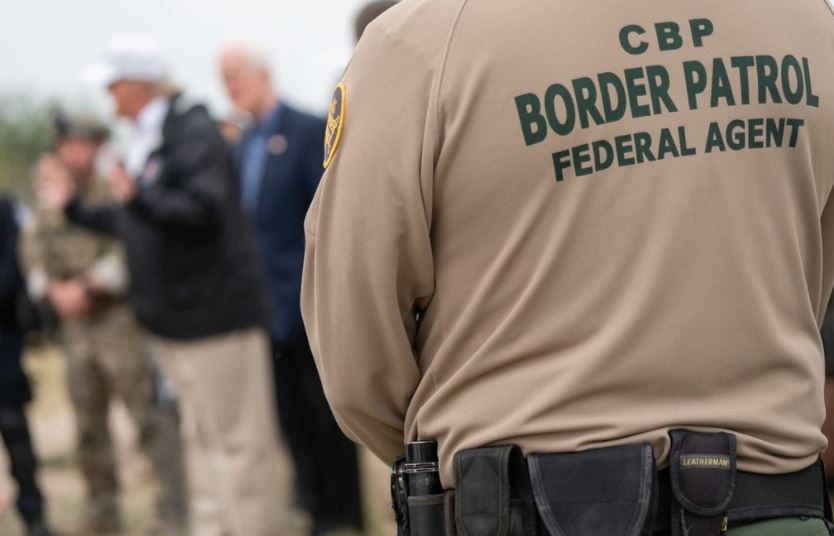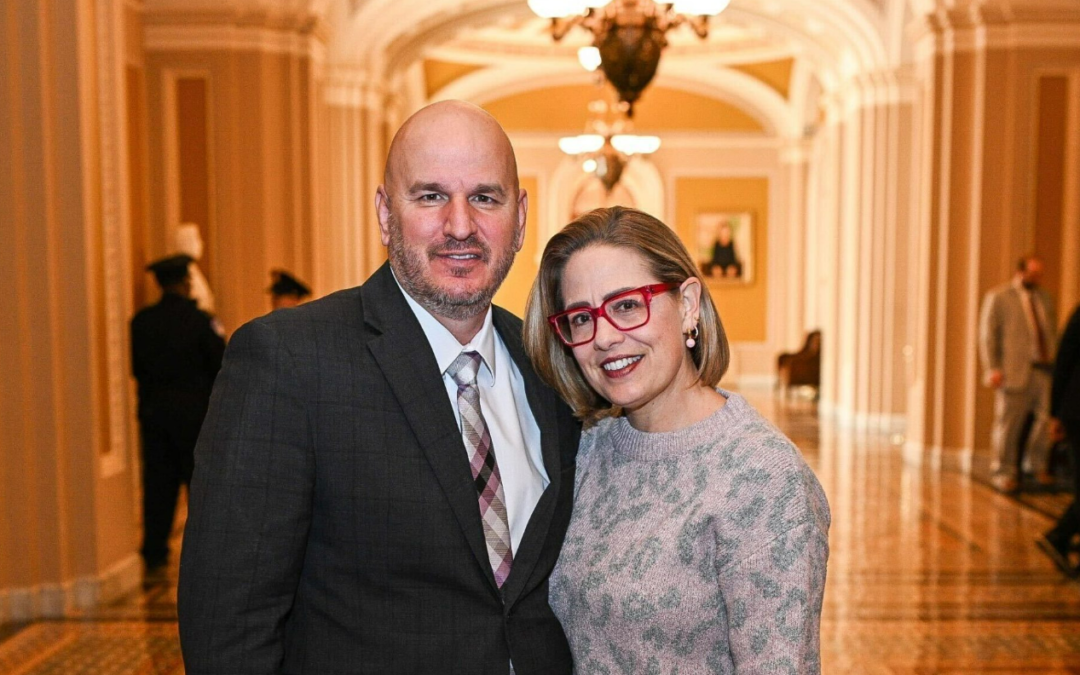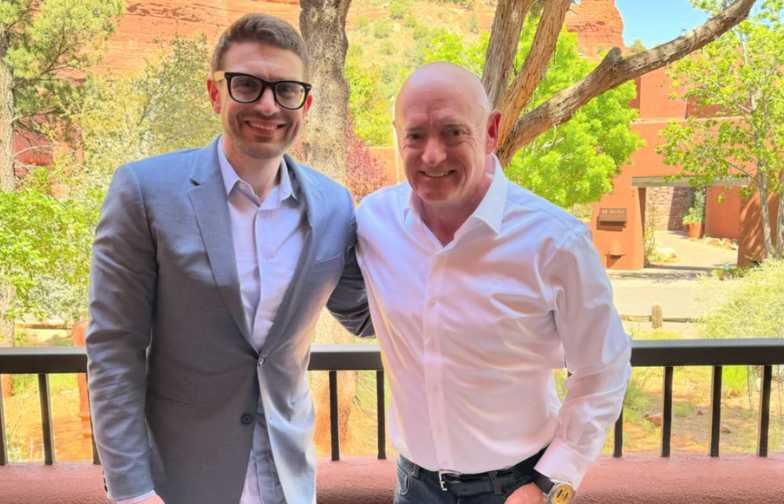
by Daniel Stefanski | May 8, 2024 | News
By Daniel Stefanski |
A powerful voice came out in support of the imminent push from the Arizona Legislature to send a border security-related ballot referral to the voters in the November General Election.
On Tuesday, Arizona House Speaker Ben Toma issued a statement to announce his support of HCR 2060, the Secure the Border Act.
HCR 2060 was originally Toma’s vehicle and primarily dealt with the state’s E-Verify program. According to Toma in February, this referral, if passed by the voters, would “expand the use of E-Verify and cut off welfare programs to illegal aliens.”
Months later, HCR 2060 is now being utilized for a more-broad approach to the illegal immigration crisis facing the state daily. If given the green light from a majority of members in both the state House and Senate, Arizona voters would have the opportunity to vote on this referral in November.
Toma said, “I fully support the Senate’s amendment to my bill, HCR 2060. The Secure the Border Act reflects a thoughtful, comprehensive approach to combating illegal immigration, which is a top priority for the Republican majorities in the House and Senate, and a leading concern for voters of all parties.”
The House Speaker highlighted the inaction from the state’s Democrat governor to use the tools at her disposal to put up a significant fight against illegal immigration – or to work with Republicans at the Legislature in good faith, writing, “It’s been incredibly disappointing that Governor Katie Hobbs has repeatedly vetoed well-crafted bills passed by the Legislature, designed to secure our southern border and protect Arizonans. The Democrats’ deliberate open-border policies have inflicted devastating, long-lasting harm to Arizona’s communities. People have had enough, and it’s time for their voices to be heard.”
He explained the various components of the proposed referral:
- “The Secure the Border Act creates two new class 6 felonies for illegal aliens who try to submit false documents or information to evade Arizona’s strong E-Verify laws or obtain taxpayer-funded public benefits. It also requires state and local agencies to verify a noncitizen’s documents and eligibility for benefits through a federal database, known as the SAVE program, whenever noncitizens apply for public benefits.
- “The Secure the Border Act establishes a new class 2 felony with enhanced prison sentences for drug dealers of illicit and deadly fentanyl. Fentanyl is the leading cause of overdose deaths in Arizona, and the amount seized at the southwest border is unprecedented.
- “Finally, the Secure the Border Act incorporates legislation from Senate Bill 1231, which all House Republicans supported but Governor Hobbs vetoed, modeled on Texas Senate Bill 4, making it a crime for an illegal alien to enter or attempt to enter Arizona at any location other than a lawful point of entry.”
The efforts from Arizona legislators to send this referral to state voters comes two months after Governor Katie Hobbs vetoed SB 1231, the Arizona Border Invasion Act, which would have “ma[de] it unlawful for a person who is an alien (unlawful immigrant) to enter Arizona from a foreign nation at any location other than a lawful port of entry and outline[d] penalties for violations of illegally entering Arizona and provide[d] immunity from civil liability and indemnification for state and local government officials, employees and contractors who enforce this prohibition” – according to the purpose from the state Senate.
In her veto letter to Senate President Warren Petersen, Hobbs said, “This bill does not secure our border, will be harmful for communities and businesses in our state, and burdensome for law enforcement personnel and the state judicial system. Further, this bill presents significant constitutional concerns and would be certain to mire the State in costly and protracted litigation.”
Senator Janae Shamp, the sponsor of SB 1231, vowed that members of her party would continue to push forward solutions to combat the border crisis, saying, “The Republican-controlled Legislature will continue to prioritize closing our border and providing law enforcement with the tools they need. This veto is a slap in the face to them, Arizona’s victims of border-related crimes, and other citizens who will inevitably feel the wrath of this border invasion in one way, shape, or form at the hands of Hobbs and Biden.”
Earlier this spring, a group of legislative Republicans signed a letter to request that House Speaker Ben Toma and Senate President Warren Petersen “convene a special committee hearing, whereby Texas-style border security legislation can be promptly advanced and placed on the ballot.”
Last week, Arizona Senate President Warren Petersen announced that legislators would soon be passing HCR 2060 by “adopt[ing] a strike everything amendment,” giving them the legislative vehicle to consider and pass the ballot referral for the November General Election.
Petersen said, “Republicans are committed to securing the border and returning sanity to our state after the chaos Democrats have willfully perpetuated with our current Governor leading the charge.”
Legislative action is expected this week on HCR 2060.
Daniel Stefanski is a reporter for AZ Free News. You can send him news tips using this link.

by Elizabeth Troutman | May 8, 2024 | Education, News
By Elizabeth Troutman |
Parents are taking back the power over their children’s education, according to a new report, and Arizona is the second-highest on the parent power chart.
For the first time in two generations, programs and policies that give parents more power over their children’s education are accelerating across the United States, according to the 2024 Parent Power! Index from the Center for Education Reform.
“Not since the beginning of the education reform movement when, between 1991 and 1999, states created 36 new laws providing parents power over their children’s education have we seen such a rapid expansion in an accelerated period of time for education innovation and opportunity,” Jeanne Allen, CER founder and CEO, said in a statement.
Florida is first on the parent power chart, followed by Arizona and Indiana.
Between 2021 and April 2024, 26 new and expanded laws governing parental options, additional flexibility to innovate, and education transparency have taken effect. At least another 600,000 students gained access to a variety of learning approaches across all education sectors.
Recent U.S. migration trends show that three of the top five states in the 2024 Parent Power Index are also among the top five states where people are moving — Florida, Arizona, and North Carolina. More than one million students left public schools to pursue other education opportunities in states with more options for parents.
“Whenever parents are engaged, change occurs,” Allen said. “Time and time again, we’ve seen that information in the hands of parents is power. When parents are able to make informed decisions about their children’s education, and states and communities are permitted to offer a myriad of pathways to enable those decisions, education works better for all students.”
State rank and policy environments are improving overall, particularly in states that have tended to embrace education freedom in general, such as Iowa, West Virginia, Ohio, and Arkansas, the data shows.
Elizabeth Troutman is a reporter for AZ Free News. You can send her news tips using this link.

by Daniel Stefanski | May 8, 2024 | News
By Daniel Stefanski |
A surprising change is coming at the top of the nation’s Border Patrol union.
Late last week, the National Border Patrol Council announced that its president, Brandon Judd, would be retiring on May 18. The union stated that Judd had “tirelessly served our members in the U.S. Border Patrol for many years, and we are excited that he is looking forward to pursuing future interests. We thank him for his service and wish him the best in his future endeavors.”
Karrin Taylor Robson, a former contender for the Republican nomination for Arizona Governor in 2022, recognized the retiring union president, writing, “Brandon Judd’s service as President of the Border Patrol Union extended well beyond the Council’s membership; his service benefited EVERY American. Thank you, Brandon, for your staunch advocacy for border policies that make every American safer. Your leadership will be missed.”
Art Del Cueto, the Vice President of the NBPC, weighed in on his colleague’s imminent departure. He said, “Well, the news is out. It saddens me but I look forward to seeing all the other things my friend and brother can accomplish. I’ve been side-by-side with him in the trenches for many years, and I truly don’t even have the words to make everyone understand all the sacrifices that he has made. His accomplishments speak for themselves. Agents are blessed to have many privileges because of the hard work Brandon Judd has done throughout the years. I’ve been extremely fortunate to have learned so much from him, not just from a work standpoint but from a life and faith in GOD perspective. I could go on and on with so much more, but I’ll save it for the book. THANK YOU my brother.”
Ali Bradley, a Network Correspondent for NewsNation reported that “NBPC Executive VP Paul Perez will fill the remainder of Brandon’s term which was set to end in March of 2026.”
Daniel Stefanski is a reporter for AZ Free News. You can send him news tips using this link.

by Daniel Stefanski | May 8, 2024 | News
By Daniel Stefanski |
One Arizona lawmaker recognized the service of nurses as their national week in the spotlight commences.
On Monday, State Representative Julie Willoughby issued a press release, “recognizing and celebrating the essential role of nurses as National Nurses Week 2024 begins.”
According to the communication, “this special week honors people in the nursing profession and the important contributions they make to care for the community…. ending on May 12th, the birthdate of Florence Nightingale, founder of modern nursing.”
In a statement to accompany her press release, Willoughby said, “Nurses make the difference. As one myself, I can attest to the critical role they play in healthcare. They serve as primary caregivers who consistently ensure the well-being of their patients day in and day out. Their dedication is clear in every facet of patient care, from direct interactions to managing complex health scenarios.”
Willoughby added, “This week, I invite all healthcare professionals, community leaders, and the public to join me in expressing gratitude for our nurses and the profound impact they have.”
The Arizona Nurses Association also marked the week, sharing a proclamation from Governor Katie Hobbs to commemorate the occasion.
The Arizona Department of Economic Security weighed in, writing, “Join us in celebrating nurses everywhere during Nurses Week! From life-saving services in emergency facilities to daily support in the homes of aging adults and people with disabilities, nurses are heroes who make the difference!”
Daniel Stefanski is a reporter for AZ Free News. You can send him news tips using this link.

by Staff Reporter | May 7, 2024 | News
By Staff Reporter |
Secretary of State Antony Blinken and Secretary of the Treasury Janet Yellen were key speakers for the McCain Institute’s 2024 Sedona Forum.
The McCain Institute is a D.C.-based organization within Arizona State University (ASU).
Blinken’s remarks were the headline of the forum, where he discussed global threats to U.S. interests, such as the conflicts in Ukraine and the Middle East and relations with China. Utah Republican Sen. Mitt Romney joined Blinken on that panel.
A transcript of Blinken’s full remarks are available here.
Yellen’s speech, “Democracy Delivers: An Economic Case for an Uncertain Era,” focused on improving the American economy to better ensure democracy and support the nation’s allies.
A transcript of Yellen’s full remarks are available here.
While in Arizona, Yellen also visited Mesa with Maricopa County Board of Supervisors Chairman Jack Sellers and Mesa Mayor John Giles. In her Mesa remarks, Yellen claimed that the economy under the Biden administration had recovered historically and only grown in strength. Yellen also claimed that the job market was healthy, and that families were spending more from their savings and extra income.
The two-day forum featured remarks from mainly Democrats, with a few Republican elected officials sprinkled in: Gov. Katie Hobbs; Sen. Mark Kelly; Sheryl Sandberg, former Facebook COO and founder of a nonprofit dedicated to establishing female leadership across the public and private sectors; David Axelrod, ASU professor and formerly Obama’s chief campaign strategist and senior advisor; Sedona Mayor Scott Jablow; West Virginia Sen. Joe Manchin; Damon Wilson, National Endowment for Democracy president and CEO, and formerly a top longtime NATO strategist; Sarah Margon, director of Democratic dark money tycoon George Soros’ Open Society Foundations; David Pressman, U.S. ambassador to Hungary, formerly Obama’s assistant secretary in the Department of Homeland Security and UN ambassador; Vermont Sen. Peter Welch; Pennsylvania Congressman Brendan Boyle; Jon Finer, deputy national security advisor, formerly an Obama administration staffer; Colorado Congressman Jason Crow; and Rhode Island Sen. Sheldon Whitehouse.
Other left-leaning individuals who spoke at the event included Sen. Kyrsten Sinema.
Other notable attendees included Alex Soros, the heir apparent to Democratic dark money tycoon George Soros’ $25 billion empire; Carl Bildt, co-chair of European Council on Foreign Relations and World Health Organization special envoy; and Nat Rothschild, of the famed trillionaire family.
The McCain Institute’s executive director, Evelyn Farkas, was Obama’s deputy assistant secretary of defense to Russia, Ukraine, and Eurasia. While in that role, Farkas advised on Russia’s first invasion of Ukraine and annexation of Crimea in 2014. Farkas was largely responsible for Russian escalation with her role in initiating the admission of Montenegro into NATO, an apparent threat to Russia. All the while, Farkas urged greater U.S. involvement in the war between Russia and Ukraine.
Farkas’ work on these European relations was key to her resignation from the Obama administration.
Farkas was one of the first to push the Russiagate conspiracy against President Donald Trump.
After war escalated again between Russia and Ukraine, Farkas again advocated for more U.S. involvement.
AZ Free News is your #1 source for Arizona news and politics. You can send us news tips using this link.

by Elizabeth Troutman | May 6, 2024 | News
By Elizabeth Troutman |
An Air Force veteran and nonprofit represented by the Goldwater Institute are suing Pima County over its “illegal” firearms mandate.
Pima County wants to fine residents $1,000 if they fail to report a lost or stolen firearm to the government within two days.
State law prohibits local governments from regulating firearms. A Goldwater press release says the county Board of Supervisors appeared to be aware of the law when they passed the ordinance.
Goldwater is suing on behalf of veteran Chris King and Pima County-based Arizona Citizens Defense League to stop the mandate.
“The new reporting ordinance isn’t just illegal—it takes aim at the wrong people,” Goldwater staff attorney Parker Jackson said. “Rather than target criminals who steal firearms, the new requirement revictimizes law-abiding gun owners who experience the loss or theft of a firearm. Some may not even realize they are victims until much later.”
King, a county resident and NRA-certified firearms instructor, said he values his right to bear arms in Arizona.
“When my apartment was burglarized, both my wife and I were on active-duty out of state, and I didn’t even discover my firearm had been stolen until a week later,” King said. “We’re a nation of laws, and Arizona law clearly prohibits local governments from imposing regulations contradictory to the laws of this state. Why do Pima County officials think they’re above the law?”
The city of Tucson made a similar attempt to limit the right to bear arms, and the Arizona Attorney General found it illegal.
Public records obtained by Goldwater show that the Pima Board of Supervisors, led by District 1 Supervisor Rex Scott and Board Chair Adelita Grijalva, has been preparing for this fight for more than two years by coordinating with left-wing activist groups, attorneys, and other elected officials, according to the news release.
“These are fundamental constitutional rights, and the state legislature has repeatedly reinforced and protected those rights from local interference through laws prohibiting local governments from implementing almost any form of firearm regulations,” Jackson said.
Elizabeth Troutman is a reporter for AZ Free News. You can send her news tips using this link.






